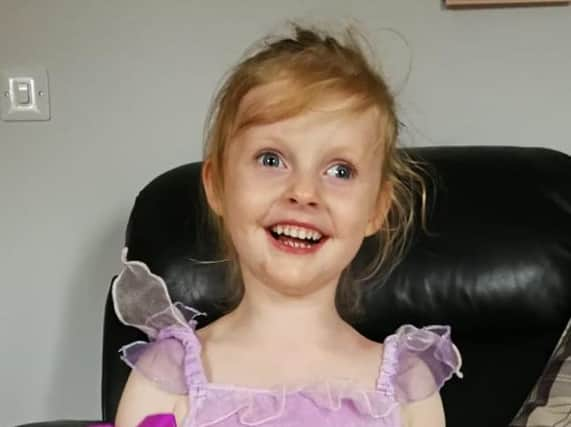Four-year-old Wakefield girl left with brain damage after diagnosis delay


Sophia Holden lives with asplenia, meaning she has no spleen and is at high risk of infection.
In October 2018, she became unwell and parents took her to Pinderfields Hospital where they waited for a diagnosis for more than an hour.
Advertisement
Hide AdAdvertisement
Hide AdSophia collapsed, and was intubated and diagnosed with sepsis. Intravenous antibiotics were administered via a central line.
Following her collapse, it was found Sophia had sustained brain damage due to a lack of oxygen.
Her speech and mobility were affected, and she suffered a visual impairment.
She also suffered injury from the siting of the central line which became dislodged and required treatment including plastic surgery.
Advertisement
Hide AdAdvertisement
Hide AdFour-year-old Sophia is now registered blind and suffers from motor-speech problems.
Mid Yorkshire Hospitals NHS Trust, which runs Pinderfields Hospital, admitted that had treatment for sepsis started sooner - within an hour of her arriving in hospital - Sophia would have avoided her injuries.
She would also not have needed a central line which resulted in further injury requiring surgery.
To mark World Sepsis Day on September 13, her parents are aiming to raise awareness of the symptoms of sepsis, and how important early diagnosis can be.
Advertisement
Hide AdAdvertisement
Hide AdSophia lives with her parents Laura and Heather, both 37, who both work as PE teachers. She has an older brother, six-year-old Finlay.
Laura said: “Sophia has been through so much in such a short time, but we are so proud of how she has coped with everything.
“When Heather and I were first told of her asplenia, it was a huge shock, mainly because it was something we had never heard of before.
“After a few months we were beginning to manage it, but then we received the devastating news that Sophia had developed sepsis.
Advertisement
Hide AdAdvertisement
Hide Ad"To make matters worse, she went on to suffer brain damage which we later found out could have been avoided if her sepsis had been treated sooner.
"Given Sophia’s history with asplenia and her increased risk of infection, we would have expected this to have been top of the list.
“It all happened so quickly and has had a massive impact on our day to day lives, but Sophia has made incredible progress since her diagnosis, learning so many skills again, and we are so proud of how far she has come.
“Sophia, along with her brother Finlay, means the world to us and, while we cannot turn back the clock and change what she has gone through, we are determined to help her live her life to the best of her ability and make sure she doesn’t miss out on anything.
Advertisement
Hide AdAdvertisement
Hide Ad“We also hope that this will urge others to be aware of the symptoms of sepsis and highlight how dangerous it can if not treated early enough.”
Sophia was diagnosed with asplenia in February 2018 at the age of two, which she takes daily antibiotics for.
Eight months later, on 15 October, she began vomiting and had a high temperature. When her symptoms failed to improve, Laura and Heather called 111 and were advised to take her to hospital. They arrived at Pinderfields just before 4am on October 16.
By 5am, Sophia was lethargic and sleepy, and her skin was mottled. Shortly afterwards, her heart rate slowed and she collapsed. She was intubated and diagnosed with pneumococcal sepsis. At the same time, she was administered antibiotics via a central line.
Advertisement
Hide AdAdvertisement
Hide AdSophia was transferred to another hospital where she underwent a scan and was diagnosed with a brain injury caused by lack of oxygen.
Almost two years on, her brain injury has led to speech problems resulting from neurological damage. She is also easily fatigued.
Sophia has underwent rehabilitation and has had to relearn many of the skills she lost as a result of her injuries.
She has regular physiotherapy to help improve her walking. Her parents purchased a hyperbaric chamber, with the support of crowd funding, that she uses for an hour a day.
Advertisement
Hide AdAdvertisement
Hide AdThe therapy is to help to try and reverse the effects of the brain injury.
Her parents have also been working with an education expert who has provided specialist sensory education books. Every six weeks, she attends Blue Skies Ahead for intensive treatment.
They have also instructed specialist lawyers at Irwin Mitchell to investigate the care their daughter received and help them access treatment and therapies they need to help Sophia.
Rachelle Mahapatra, lawyer at the firm representing Sophia, Laura and Heather, said: “The past two years have been incredibly difficult for Sophia’s family, having to go through the trauma of sepsis and the lasting impact it has had on their lives.
Advertisement
Hide AdAdvertisement
Hide Ad“Through our work, we sadly often see how quickly sepsis can have life changing impacts, and how early detection and treatment are key to beating it and preventing any after-effects.
“While nothing will change what has happened to Sophia, we welcome the Trust’s admission and will continue to support Sophia’s family in accessing the specialist care and support they require to help her live life as best she can."
David Melia, director of nursing and quality at the Mid Yorkshire Hospitals NHS Trust, said: “We are very upset that Sophia and her family have had to go through the trauma of sepsis and the lasting impact it has had on their lives.
“The trust is committed to making improvements and in the last three years we have put a sepsis action plan in place and we have worked closely with our medical and
nursing staff on early detection and treatment.
“We would like to support Sophia’s family using their awful experiences to raise awareness of the symptoms of sepsis, and how important early diagnosis is."